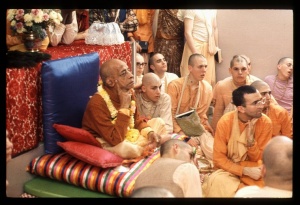SB 5.4.6

A.C. Bhaktivedanta Swami Prabhupada
TEXT 6
- yasya ha pāṇḍaveya ślokāv udāharanti—ko nu tat
- karma rājarṣer nābher anv ācaret
- pumān apatyatām agād yasya
- hariḥ śuddhena karmaṇā
SYNONYMS
yasya—of whom; ha—indeed; pāṇḍaveya—O Mahārāja Parīkṣit; ślokau—two verses; udāharanti—recite; kaḥ—who; nu—then; tat—that; karma—work; rāja-ṛṣeḥ—of the pious King; nābheḥ—Nābhi; anu—following; ācaret—could execute; pumān—a man; apatyatām—sonhood; agāt—accepted; yasya—whose; hariḥ—the Supreme Personality of Godhead; śuddhena—pure, executed in devotional service; karmaṇā—by activities.
TRANSLATION
O Mahārāja Parīkṣit, to glorify Mahārāja Nābhi, the old sages composed two verses. One of them is this: "Who can attain the perfection of Mahārāja Nābhi? Who can attain his activities? Because of his devotional service, the Supreme Personality of Godhead agreed to become his son."
PURPORT
The words śuddhena karmaṇā are significant in this verse. If work is not carried out in devotional service, it is contaminated by the modes of material nature. That is explained in Bhagavad-gītā: yajñārthāt karmaṇo 'nyatra loko 'yaṁ karma-bandhanaḥ (BG 3.9)). Activities performed only for the satisfaction of the Supreme Lord are pure and are not contaminated by the modes of material nature. All other activities are contaminated by the modes of ignorance and passion, as well as goodness. All material activities meant for satisfying the senses are contaminated, and Mahārāja Nābhi did not perform anything contaminated. He simply executed his transcendental activities even when performing yajña. Consequently he obtained the Supreme Lord as his son.